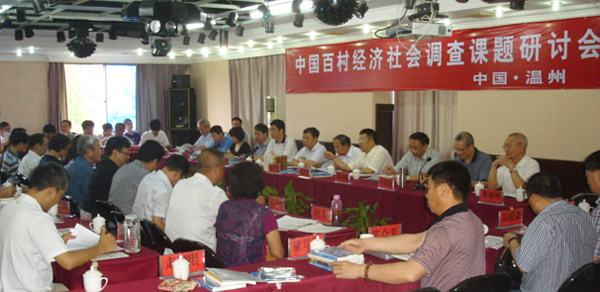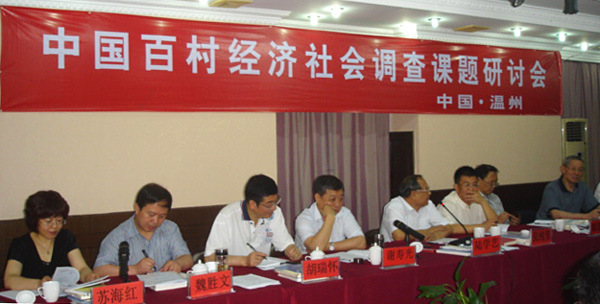A meeting on One-Hundred-Village Economic and Social Investigation held in Wenzhou

A meeting on One-Hundred-Village Economic and Social Investigation was held in the Party School of the Wenzhou Municipal Party Committee, June 5-7, 2012. It was presided by Hu Ruihuai, Deputy President of the School. Zhang Chunfang, Executive Deputy President of the School introduced the socio-economic development of Wenzhou, conditions of the investigation base at Daqiao Village, Ruian City, as well as the preparatory work of the One-Hundred-Village Economic and Social Investigation.
Xie Shouguang, President of the Social Sciences Academic Press (shehuikexue wenxian chubanshe) provided an overview of the project. He stated that under the current international and domestic conditions, social sciences, especially sociology should play an important role. At present time, social scientists shoulder four missions: construction of social transition theory, research on social issues, recording of social change, and active involvement in it. He stressed that this investigation is such a project which could integrate these missions, which would provide a platform for rural studies in China. He himself would do his best to give support to the success of the project.

Professor Lu Xueyi, Honorary Academician of CASS and Head of the One-Hundred-Village Project focused on the specific work of the Project, which was listed among the key projects by the National Social Sciences Foundation in October, 1998. Since then, three project meetings have been held respectively in Beijing and Anhui in 2001, 2002 and 2009. A series of 14 books from the project have been published, which have played important roles in understanding current rural social conditions, improving rural policy making and implementation, and promoting theoretical advancement. In addition, young researchers have been recruited through the project, and, through research and publication, a large number of researchers have become backbone of various social sciences academies, higher education, Party schools or governmental functionaries; so the Project has contributed to social science advancement in different regions in China.
Lu continued that rural transformation constitutes a main part of the social transformation in China. On China’s way to modernization, its urban areas have been developing very rapidly, and the level of urban modernization is compatible to that of the developed countries; yet, modernization in rural areas is far from completion. Socio-economic development in especially the underdeveloped areas in the northwestern regions is still quite backward. He stressed that as social construction would be a strategic focus in the upcoming years, it would be invaluable to continue the One-Hundred-Village Investigation for a deepened understanding of the national conditions, as well as the state of social construction in present rural areas.
During the discussion, Professor Wang Kaiyu from Anhui Province and others shared their project experiences. Wei Shengwen, Deputy President of Gansu Academy of Social Sciences made constructive suggestions for the continuation of the project. Representatives from Liaoning, Qinghai, Guangxi, Hei Longjiang, Hebei, Hunan, Tianjin, Jiangsu, Zhejiang and Guangdong participated in the discussion. Representatives from Henan, Nanjing, Hei Longjiang, Qinghai and Guizhou proposed to set up new sites of investigation in their respective provinces.
This meeting was organized by the “One-Hundred-Village Economic and Social Investigation” project group and the Social Sciences Academic Press, assisted by the Party School of Wenzhou Municipal Party Committee and Wenzhou Administrative College. About 60 participants from nearly 30 organizations attended the meeting.


